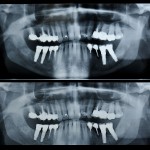
Dental implants demonstrate good long-term success rates. However diabetes is considered to be a risk factor compromising osseointegration.
The aim of this review was to assess any difference in implant failure rate or marginal bone loss between type 1 or 2 diabetes subjects and non-diabetic subjects.
Methods
Searches were conducted in the Medline, Embase, Cochrane CENTRAL, Web of Science, OpenGRAY and ClinicalTrials.gov databases In addition manual searches were conducted in the journals, Journal of Periodontology, Journal of Clinical Periodontology, Journal of Periodontal Research, International Journal of Periodontics and Restorative Dentistry, Clinical Oral Implants Research, Clinical Implant Dentistry and Related Research, International Journal of Oral and Maxillofacial Implants, International Journal of Oral and Maxillofacial Surgery, Implant Dentistry, Journal of Dentistry, Journal of Prosthodontics, and Journal of Dental Research.
Prospective and retrospective cohort studies and randomised controlled trials (RCTs) comparing implant failure rates and marginal bone loss between type 1 or 2 diabetes subjects and non-diabetic volunteers were considered. Implant failure was considered to be implant loss. Two reviewers selected studies and abstracted data. Risk of bias was assessed using the Newcastle-Ottawa Scale (NOS). Continuous and binary variables from the studies were subjected to meta-analysis when at least two of the studies assessed reported the same data type.
Results
- 14 studies (2 prospective cohorts, 3 retrospective cohorts, 9 CCTs) were included
- All studies score more than 6 points on the NOS.
- 802 diabetic and 1532 non-diabetic patients were assessed, with the installation of 1551 and 6353 implants, respectively.
- Only one study assessed subjects with type 1 diabetes.
- The mean success rate for diabetics ranged from 31.8% to 100% and 86.1% to 100%for non-diabetics
- The mean annual failure was 3.92% for diabetics and 1.65% for non-diabetics.
- There was no statistically significant difference between type 2 diabetes subjects and non-diabetic subjects for implant failure, with a RR =1.43 (95%CI;0.54–3.82 P = 0.47)
- Analysis of type 1 diabetes subjects also failed to show a statistically significant difference when compared to non-diabetic subjects, RR =3.65 (95%CI; 0.33–40.52,P = 0.29).
- There was no significant difference between the two types of diabetic subjects with regard to implant failure, RR= 1.56 (95%CI; 0.62–3.91P = 0.34)
- The fixed-effects model was used to assess marginal bone loss, due to the medium heterogeneity found between the studies reviewed (P = 0.15, I2 = 44%).
- A statistically significant difference was observed in favour of the non-diabetic group for marginal bone loss with a MD = 0.18 (95%CI; 0.14–0.21, P < 0.00001)
Conclusions
The authors concluded:-
The results of this systematic review suggest that the rate of implant failure is not higher for diabetic subjects than for non-diabetic subjects. Additionally, the comparison between type 1 and type 2 diabetes subjects showed no evidence of a higher failure rate for either group. With regard to marginal bone loss, there was a statistically significant difference favouring non-diabetic subjects.
Comments
The results of this review are similar to another recent review by Shi et al. They conducted a meta-analysis on 7 studies involving 252 patients and 587 dental implants. Their analysis did not show a direct association between the glycaemic level in patients with diabetes and the dental implant failure rate RR =0.620 (95%CI;0.225-1.705). Both reviews highlight the need for higher quality studies to verify their findings.
Links
Primary paper
Moraschini V, Barboza ES. The impact of diabetes on dental implant failure: a systematic review and meta-analysis. Int J Oral Maxillofac Surg. 2016 Jun 10. pii: S0901-5027(16)30091-1. doi: 10.1016/j.ijom.2016.05.019. [Epub ahead of print] Review. PubMed PMID: 27297836.
Other references
Shi Q, Xu J, Huo N, Cai C, Liu H. Does a higher glycemic level lead to a higher rate of dental implant failure?: A meta-analysis. J Am Dent Assoc. 2016 Jul 16. pii: S0002-8177(16)30508-6. doi: 10.1016/j.adaj.2016.06.011. [Epub ahead of print] Review. PubMed PMID: 27435008.
Chen H, Liu N, Xu X, Qu X, Lu E. Smoking, radiotherapy, diabetes and osteoporosis as risk factors for dental implant failure: a meta-analysis. PLoS One. 2013 Aug 5;8(8):e71955. doi: 10.1371/journal.pone.0071955. Print 2013. PubMed PMID: 23940794; PubMed Central PMCID: PMC3733795.

Lee-Anne Wilmot. What do they say at your studies. I always thought diabetes is a no-no. Same as smoking.
[…] post Implant failure: Is it higher in diabetic patients? appeared first on National Elf […]
Review suggests dental implant failure not higher in diabetics https://t.co/ZjROQm0cIK
Do diabetics have a higher dental implant failure rate? https://t.co/ZjROQm0cIK
Dental implant failure not higher for diabetics- suggests review https://t.co/ZjROQm0cIK
Don’t miss- Implant failure: Is it higher in diabetic patients? https://t.co/ZjROQm0cIK